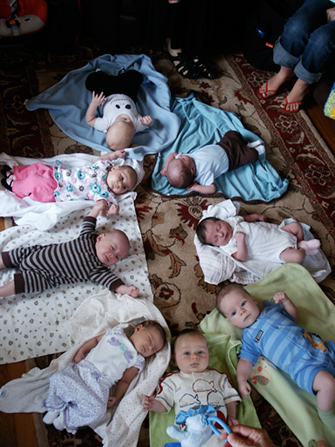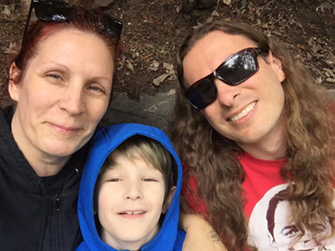Three-time PEPS leader nudges new parents back to life
It helped them to know that when their baby was falling apart, it meant they were learning new skills. To help them to see that helped a lot.


Inspired by this Story?
LEAD A GROUPPEPS Group Leaders create a welcoming space for new parents to share, connect, and support one another. If you loved being part of a PEPS group, join again as a leader. We provide training and support for you to lead or co-lead a group. Learn more at Lead a Group.
Share Your Story
Inspire others parents by sharing your story with PEPS!
- By SHAWNA GAMACHE
Michelle Palmer loves when she hears that the moms in her PEPS groups are getting together for neighborhood walks and barbecues.
The West Seattle mom said she learned first-hand how much new parents need each other in the early months. When her son Caiden was born eight years ago, Michelle said she had to re-learn who she was. She was an older mom, and most of her friends already had older children or were not planning on parenthood.
“When your first child is born, it changes your perspective and what’s most important to you,” said Michelle, a treatment massage therapist and dance instructor. “PEPS made me realize how important a community of fellow parents is.”
Her PEPS group grew close quickly, and the friendships she made at PEPS helped Michelle immensely through the early years. Many of the moms in her group went on to enroll their toddlers in co-op preschool together and they still see each other regularly.
Now, Michelle thrives on helping other new parents form the connections that were so important to her in the beginning. Michelle has led three PEPS groups in West Seattle and she loves to foster connections, allay fears and help new parents get back out into their neighborhoods.
Michelle co-led her first group with another mom from Caiden’s PEPS group when their babies were 14 months old. The moms alternated leader duty, with one taking the two toddlers while the other mom led the PEPS group, and then switching the next week.
Michelle said it’s a great idea to start leading as soon as possible, while all the new baby concerns and information are fresh in your brain, and having a co-leader can solve the childcare dilemma. But it’s also fun to lead a few years later, when you have more confidence and knowledge to share. During that first group, Michelle said she just stuck to the script. But now she has the confidence to make the leader experience her own.
Michelle goes out of her way to nudge new parents out of the house together. She said a lot of that is helping them figure out how to do things with babies in tow. So when she recommends a resource like the toddler class at a local co-op preschool, she suggests that parents team up to attend the information night, watching each other’s babies in the parking lot so each will have a chance to attend the meeting briefly child-free.
“She knows her stuff!” said one parent in a mid-point survey from Michelle’s most recent West Seattle group. “She’s very engaged with everyone, and has helped us to foster our own relationships outside structured time.”
“It helps our sanity, (helps relieve) that four wall syndrome.” -Michelle Palmer
During the early meetings, Michelle suggests walks together through their neighborhood, mom and baby yoga classes, the local Stroller Strides program and local cafes like Chaco Canyon with good play areas for babies. She is happy when her group members are getting together several times a week.
“It’s so nice to see people connecting,” Michelle said. “Especially when our kids were so young, that was so valuable for me.”
PEPS intentionally recruits leaders from the same neighborhoods as their groups so that they will be well-connected to local resources, activities and concerns, according to PEPS Volunteer Manager Cate Palmer (no relation to Michelle).
“Not only do parents benefit from staying connected, and benefit from the those relationships as they move into preschools, elementary schools, soccer teams, summer camps,” said Cate. “It’s also a more powerful and satisfying experience for our volunteer leaders when they are embedded in groups close to home, because “building community” is then less of an abstract and becomes a very real experience, applying literally in their neighborhood.”
Michelle keeps the focus on the new parents and the relationships they are forming. So when she couldn’t attend one of her daytime meetings at the scheduled time, she moved the meeting to the evening so the dads could meet as well.
“I’ve never seen a leader do that – it was great for the dads to meet each other,” said Cate.
“Before I went into that group, I had some trepidation on whether I could relate to certain people I had never met before.” -Michelle Palmer
Michelle has learned how to personalize her leader experience, sharing additional information and resources she’s collected over the years from parenting workshops and early development classes, and getting creative within the framework of the recommended discussions.
It’s important that any resources shared should be parallel to the PEPS topics, Michelle said, but there is still plenty of room for creativity. Like recommending that moms check out theshapeofamother.com during the group discussion of body image and self esteem, and sharing John Gottman’s Seven Principles for Making Marriage Work during the discussion of relationships and couple time.
“The first time I thought ‘Well, I hope they don’t tune me out,’ but on the contrary they were more engaged and they had a lot of comments,” Michelle said.
During a recent group discussion of emotional changes and challenges, Michelle had a group of moms write a feeling they wanted to get rid of on quick burn tissue paper squares, and then the group burned them on her deck. Then she asked them to replace that spot inside with something positive like an aspect of their life as a parent that's gotten better, or something they've noticed they're good at.
Michelle said she also appreciates the opportunity to help allay parenting fears early on. She loves that the PEPS format addresses nursing and feeding so early. Michelle said many new moms can be panicked that their child isn’t getting as much milk as they need, and normalizing those concerns is essential.
“I want to emphasize that nursing is an instinct but the technique is learned for both of you,” Michelle said. “I think everyone just breathes easier once they hear that. The lines on their foreheads relax a bit.”
Michelle said she tries to bring humor and lightness to heavy discussions.
“I definitely feel like—and it’s the same thing with my dance troupe— if you’re not having fun, why are you there?” Michelle said. “If you don’t have humor, it’s really hard.”
She also strives to bring home the message that the job of a parent is constantly changing along with the needs of your child. She works to reframe difficult or challenging periods as an indicator of developmental change in the child.
“It helped them to know that when their baby was falling apart, it meant they were learning new skills,” Michelle said. “To help them to see that helped a lot.”
Above all else, Michelle loves spending time with new parents and their babies. She feels lucky that she can comfort and empower them and help bring them together.
“I get to go and hold babies, but then I get to go home and go to sleep at night."
About the Author
 Shawna Gamache is a former newspaper reporter and just launched a new blog Critical Playdate. She is mama to Ruby, 4, Quinn, 6, and Nora, 17 months. In her quiet moments, Shawna loves writing, reading and avoiding eye contact with her laundry pile.
Shawna Gamache is a former newspaper reporter and just launched a new blog Critical Playdate. She is mama to Ruby, 4, Quinn, 6, and Nora, 17 months. In her quiet moments, Shawna loves writing, reading and avoiding eye contact with her laundry pile.
Document Actions